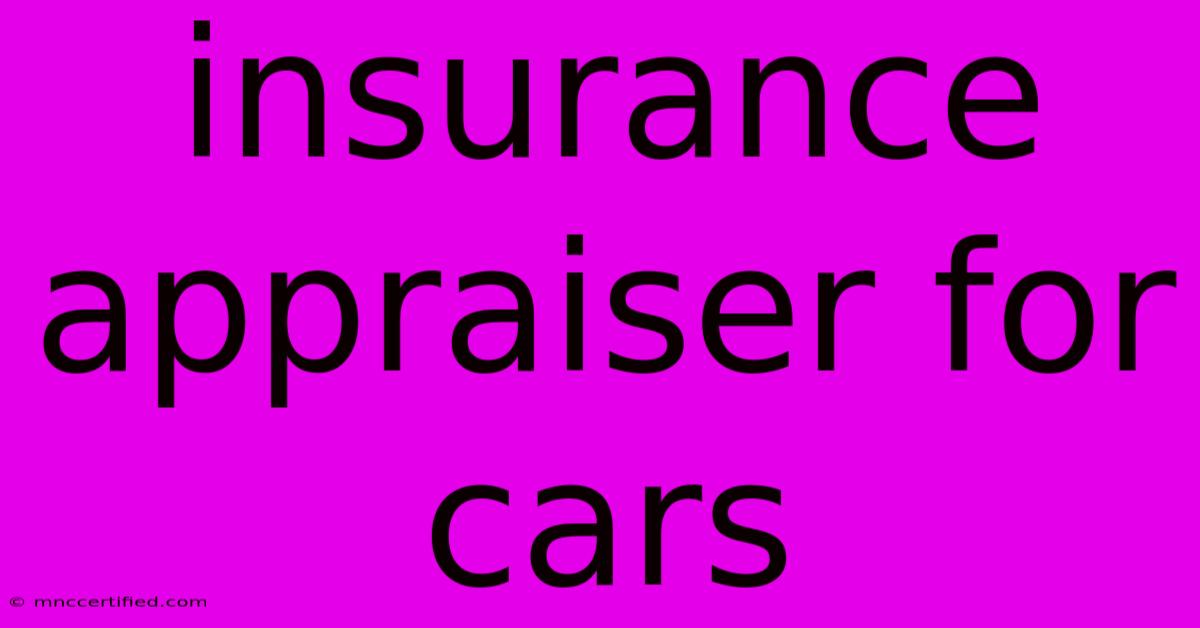Insurance Appraiser For Cars

Table of Contents
Insurance Appraiser for Cars: Your Guide to Accurate Vehicle Valuation
Finding yourself in a car accident or facing significant vehicle damage can be stressful. Navigating the insurance claim process adds another layer of complexity, and understanding the role of an insurance appraiser for cars is crucial to ensuring a fair settlement. This comprehensive guide will demystify the process, explaining what an auto appraiser does, how they determine vehicle value, and how to choose the right one for your needs.
What Does an Insurance Appraiser Do?
An insurance auto appraiser is an independent professional who assesses the damage to a vehicle and determines its fair market value (FMV). Their expertise is vital in resolving insurance claims, especially in cases of significant damage or total loss. They act as impartial evaluators, providing an objective assessment that helps both the insurance company and the vehicle owner reach a fair settlement. Their work goes beyond simply looking at dents and scratches; they consider:
- Vehicle history: Mileage, maintenance records, accident history, and any modifications significantly impact the vehicle's value.
- Market conditions: Current market prices for similar vehicles are crucial in establishing FMV. They use various databases and resources to stay updated on current market trends.
- Damage assessment: A thorough examination of the vehicle's damage is essential. This includes identifying the extent of repairs needed and whether the damage is repairable or if the vehicle is a total loss.
- Documentation: Detailed reports, including photos and supporting documentation, are crucial for transparency and supporting their valuation.
Types of Insurance Appraisers
While all appraisers aim for accuracy, there are different types involved in the process:
- Company Appraisers: These are employed directly by insurance companies. While they aim for objectivity, their employment might lead to potential biases.
- Independent Appraisers: These professionals are not affiliated with any insurance company, offering a more neutral perspective. They are often chosen when disputes arise between the insurance company and the vehicle owner.
How is Vehicle Value Determined?
Determining the fair market value of a vehicle isn't a simple process. Insurance appraisers use various methods, including:
- Market Comparison Approach: This involves comparing the damaged vehicle to similar vehicles currently for sale in the same geographic area. Factors like year, make, model, mileage, and condition are carefully considered.
- Cost Approach: This method estimates the cost of repairing the vehicle to pre-accident condition, plus the vehicle's depreciation. It's particularly relevant for repairable vehicles.
- Income Approach: This method is less common for individual vehicles but considers the vehicle's potential income-generating capacity if used for commercial purposes.
Factors Affecting Vehicle Value
Several factors influence the final valuation:
- Vehicle Age and Mileage: Older vehicles with high mileage generally have lower values.
- Condition: A well-maintained vehicle in excellent condition will command a higher price than a neglected one.
- Features and Options: Added features and options increase the vehicle's value.
- Market Demand: The popularity of a specific make and model can influence its value.
Choosing the Right Insurance Appraiser
Selecting a qualified and reputable auto appraiser is critical. Consider these factors:
- Experience and Credentials: Look for appraisers with extensive experience and recognized certifications, such as those from industry associations.
- Reputation: Check online reviews and seek recommendations from trusted sources.
- Objectivity: An independent appraiser offers a more unbiased assessment.
- Transparency: Ensure the appraiser provides a detailed report explaining their valuation methodology.
Dispute Resolution with Insurance Appraisers
Disagreements can arise between the vehicle owner and the insurance company regarding the appraised value. If this happens, consider:
- Reviewing the appraisal report: Carefully examine the report for accuracy and justification of the valuation.
- Seeking a second opinion: Obtain a second appraisal from an independent appraiser to compare results.
- Mediation or Arbitration: Consider these options for resolving disputes fairly and efficiently.
- Legal counsel: If all else fails, consult with an attorney specializing in insurance claims.
By understanding the role of an insurance appraiser for cars and the process of vehicle valuation, you can navigate the insurance claim process more effectively and ensure you receive a fair settlement for your damaged vehicle. Remember, choosing a qualified and reputable appraiser is key to a successful outcome.

Thank you for visiting our website wich cover about Insurance Appraiser For Cars. We hope the information provided has been useful to you. Feel free to contact us if you have any questions or need further assistance. See you next time and dont miss to bookmark.
Featured Posts
-
Travis Hunter Stats Colorados Impact
Nov 30, 2024
-
Alaskan Malamute India Price
Nov 30, 2024
-
Wood Bond Girl Nyt Crossword
Nov 30, 2024
-
Colorado Deions Sons Walk
Nov 30, 2024
-
Domestic Violence Bail Bonds
Nov 30, 2024